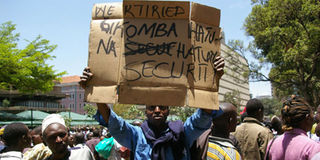Low scale conflicts fuelling insecurity in Africa: experts

Traders and residents of Nairobi's Gikomba open air market demonstrate against insecurity. Photo/XINHUA
Africa should prioritise dealing with low-level local conflicts in order to prevent them from spreading to become regional security threats, experts said.
Various security experts with knowledge of security issues in Africa agreed that factors like ethnicity and unequal access to social services can blow up village level conflicts into a national or regional security issue.
"Why is the international community unable to help countries like Democratic Republic of Congo achieve peace? It's simply because the conflicts there have very local origin," said Severine Autesserre, political scientist and author of the book, 'The Trouble with Congo: Local Violence and the Failure of International Peacebuilding.'
"The standard operation procedures of foreign diplomats are not enablers in making them understand dynamics of conflicts there," said Autesserre.
She said local conflicts in most of Africa are the enablers of the large scale conflicts.
"So the continent needs to build micro and macro peace-building capacity. Governments need to increase funding for local conflict resolution mechanisms," she said in a recent interview with Xinhua in the Kenyan capital Nairobi.
She said there is a need for an inclusive peace-building model that should be active at local level involving the government, local representatives and the civil society.
In most informal settlements in Africa for example, a dispute between two people of different ethnic backgrounds can result in full blown war between the communities living there because of existing strong ethnic suspicious, security analysts said.
Chris Greyling of the Pan-African Security Association said inequality in the access to quality social services is one of the major problems fuelling conflicts in Africa.
A way should be found to ensure that dividends from the growing economies are enjoyed equitably.
Often, rebel groups sprout with reasons of unequal access to resource or political power, matters that should be addressed before they fuel national conflicts.
When local conflicts are spreading, their spread is aided partly by shortage of policing resource as the population is increasing at a higher pace than the recruitment of new police officers.
According to Greyling, this situation calls for strengthening of the policing systems and recognising of policing so that it can handle the emerging security threats.
Growing crime in the urban centres presents a bigger challenge to the police because of the poor urban planning that makes it difficult to chase after the criminals, analysts said.
In the informal settlements for example, the roads and walking paths are narrow, limiting police mobility.
Growing frequency of traffic jams in the main cities means that police mobility is also inhibited, giving criminals an opportunity to escape.
According to Greyling, there is a need for consideration of professionalising private security operations in Africa so that they can supplement the inadequacy of the national police systems.
"First is to have very proper controls over the private security industry. Then we need to establish symbiotic relations between national police agents and private security professionals," he said in an interview.
Africa also faces a security challenge from the retired military officers. According to Greyling, one of the options for governments is to offer commercial qualification to retired military officers so that they find jobs in the private sector.
"This will prevent them from being sucked into criminal world. These are people who have excellent organization among other skills and can therefore be very useful even after their military service," he said.
He said in some of the most well organised criminal gangs in Africa, it is not unlikely to find that some of the top coordinators are ex-military officers.
According to the World Bank's World Development Report on Conflict, Security and Development, violence is one of the central development challenges of this time.
The report predicted that by 2025, the locus of global poverty will overwhelmingly be in conflict affected, mainly low income, African states.
Countries in conflict have poverty rates that are on average 20 points higher than their impoverished but peaceful counterparts, and are struggling to achieve the Millennium Development Goals (MDG), according to the World Bank.
"The challenges facing these states are thus not limited to dealing with the recurring cycles of violence that they experience but also include the chronic poverty that accompanies this violence," noted the World Bank report.




